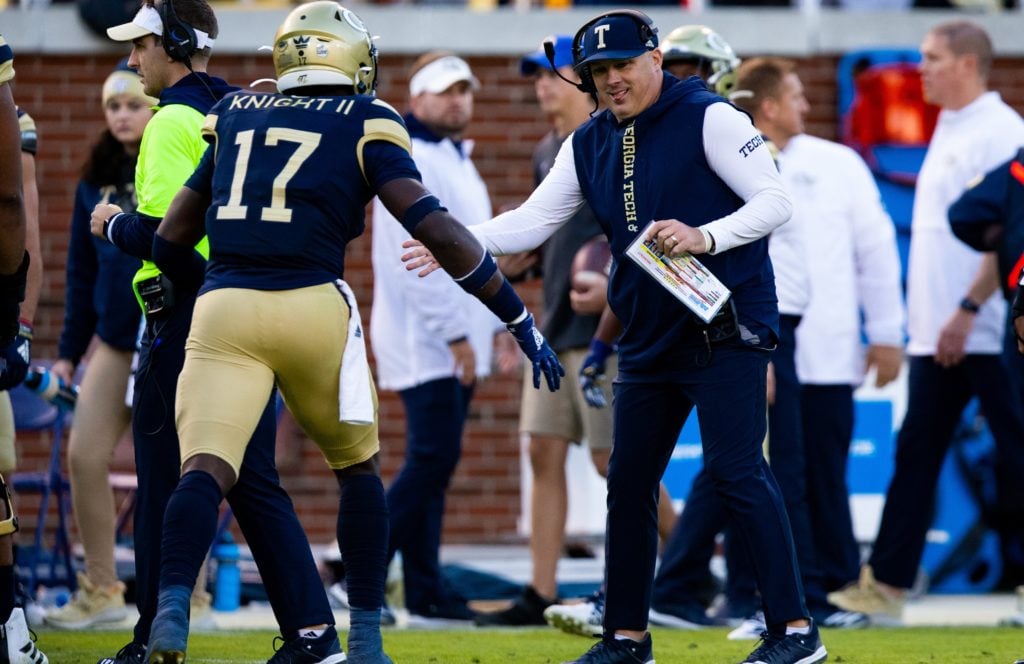Enacting an open-door policy
Doors can open from both sides, and that is something this Georgia Tech coaching staff has made a point to understand.
Greater Atlanta Christian head coach Tim Hardy spoke on the importance of being able to take players on his team to the top universities in the state: Georgia Tech and Georgia. Both having an open-door policy means something to the high school programs in the state, and Hardy said he has seen a real push by Georgia Tech this year to get high school players, teams and coaches on campus.
“I love having the opportunity to go to the flagship universities in our state, both just 45 minutes to an hour away from our campus and get our guys playing in their facilities, talking to their coaches, all of that kind of stuff,” Hardy said. “There’s been an intentional action by Coach Collins and his staff to welcome high school coaches and their teams to Georgia Tech.”
But this goes a little deeper for coaches in the area like Hardy. That door opens the other way, too, and Hardy said another piece of this effort involves that part of relationship building.
“There’s a real intentional effort to get on our campus, to be on our campus, to communicate,” Hardy said of Georgia Tech’s coaches. “Multiple times this year a Georgia Tech coach has been on campus during the season which, really, I think is great.”
Glisson has been a coach in the state for more than 20 years and has seen his share of college coaches come and go. During the last recruiting cycle, Glisson said there were 92 college programs that made their way to Troup County. He has been around the block when it comes to hearing the bells and whistles of recruiting, but Glisson said Georgia Tech did something during this staff’s first year that he had never seen before.
The Troup County head coach said he was skeptical when Georgia Tech rolled out the red carpet and opened up its doors to allow high school coaches in. After his Waffle House lunch with Collins, Glisson said he wanted to see how deeply the coach’s sentiments went in regards to promises made.
“I wanted to get on campus because I wanted to see if it was real,” Glisson said. “I wanted to see what they were selling, answering, ‘Was it fake?’ or ‘Was it real?’
“And now, I’ve been on campus probably a half a dozen times just to be a fly on the wall, and it is 100 percent real. The culture, the branding, all of that, what they’re selling is real.”
Glisson remembers the exact day and moment when that realization dawned on him: when he picked up the phone and called Collins one day.
It wasn’t a conversation about any player or even a call just to check in and catch up. It actually wasn’t a phone call about recruiting purposes at all. Glisson had a request: He runs a college-like program, like many other growing programs in the state, and has a $15 million practice facility and a football support staff made up of students. His request was that he wanted to bring those students to Georgia Tech.
“We have a couple of students who don’t play football, but they run our technology, they do our nutrition, they do a lot of stuff for us,” Glisson said. “And Collins said, ‘Yeah man, bring them up here, and I’ll get them with our guys.’”
So, Glisson and a small group of Troup County students loaded up a car and made the hour drive up I-85 to Atlanta for a visit. The group spent about five hours with the Georgia Tech support staff taking a look at marketing and graphics, technology and data. Those five hours sold it for Glisson.
“I’ve never taken five non-football players on a recruiting trip in my life,” Glisson said with a big laugh. “That is when I knew it was real.”
The doors to many top college programs have been opened for Glisson before throughout his career. He has sat in the offices of some of college football’s most respected and winningest coaches. But what Georgia Tech did for his support staff meant a bit more.
“I’ve been all over,” Glisson said, “but I thought that might have been one of the coolest moments of my career.”
There’s something to be said about the way the state’s coaches discuss Georgia Tech’s open-door policy enacted during the past year. It’s one that many of them notice to be just a bit different for their players, their support staffs and themselves.
“I feel like I could call up Coach (Andrew) Thacker, Coach (Kerry) Dixon, Coach Collins if I wanted to come down there, and I know they would say, ‘Coach, come on,’” Carter said. “That means a lot to coaches across this state, I promise you. And we take notice of that stuff.”
Capturing the city
There’s one final thing that high school coaches in the state have taken notice of, and that’s the way Georgia Tech is marketing and branding its ties to Atlanta. During every interview for this story, each coach brought that up as something Georgia Tech’s staff is doing to change the way people think about the program.
“What he’s doing is embracing the city of Atlanta,” Hardy said. “He’s saying, ‘We are Atlanta’s school.’”
Hardy used the example of what Northwestern did by branding itself as Chicago’s team, posting pictures of the team in front of the Chicago skyline. It’s similar to Georgia Tech’s recent marketing style.
“I think Coach Collins is brilliant with his branding, and according to the staff, it’s him. One time I made a comment that, ‘Man, you’ve got a great marketing person,’ and they said, ‘Oh no, that’s Coach,'” Hardy said. “I really love what Collins has done by saying, ‘Hey, we’re in Georgia. but we are
Atlanta’s team.’ Students can vibe to that; athletes can connect to that. I think that’s the piece that (Collins) has really brought into the next era.”
Another example of this city connection — particularly in the role it plays within recruiting and how it can shape a future — came from Mays head coach Niketa Battle. Battle compared it to what Miami did in the early 1980s under head coach Howard Schnellenberger.
“When Schnellenberger took over the program down in Miami, he went and got kids within the city, and that made Miami great for years after,” Battle said. “Now, Geoff, when he came from Temple, he and his staff came down here with that same Schnellenberger-type mentality: to come in and win the city first and then we’ll go out and get other kids. That’s why — no matter what the record was this year (3-9) — they have put a bug in the city that a major Power 5 university actually wants kids from the inner city.”
Battle explained there have been a few times through the years that inner-city players have been somewhat overlooked just because of the way recruiting was handled in the past. But with the narrative around the state’s recruiting changing — particularly with the increased interest in the Greater Atlanta area and metro-area schools — fewer of those players are being overlooked.
With Georgia Tech being at the center of Atlanta, Battle explained the program has an opportunity to do something not many programs have been able to do.
“I’ll tell you what, Geoff knows the state of football in the city,” Battle said. “So if Georgia Tech comes in and does something that no one else has done, I think the city will win. The Falcons win. The high schools win. The surrounding schools in the city win.”
That is why so many high school coaches believe that this piece of the story for the new staff may be the most important as it lays the groundwork for the future. This staff inherited something unique, and it’s attempting to do something unique with the opportunity Georgia Tech’s location presents.
“What they’ve done is they’ve established an excitement around the place that has good bones already,” Carter said. “I think that’s important to know because it wasn’t like they were coming into a situation that had absolutely nothing. They have good resources. They have players. They won some games. So, really, what you try to do is go in there and put your stamp on it. I think they’ve done a really good job with that.”
More than anything, the coaches agree, that means capturing Atlanta.
“They connected with kids, and they have connected with a community in Atlanta, which I think was really the biggest thing they have done, honestly,” Carter said. “To get the city of Atlanta to buy into Tech and support Georgia Tech football, I think that is the biggest thing they could have done.”
https://theathletic.com/1464232/201...chs-recruiting-changes/?source=shared-article


